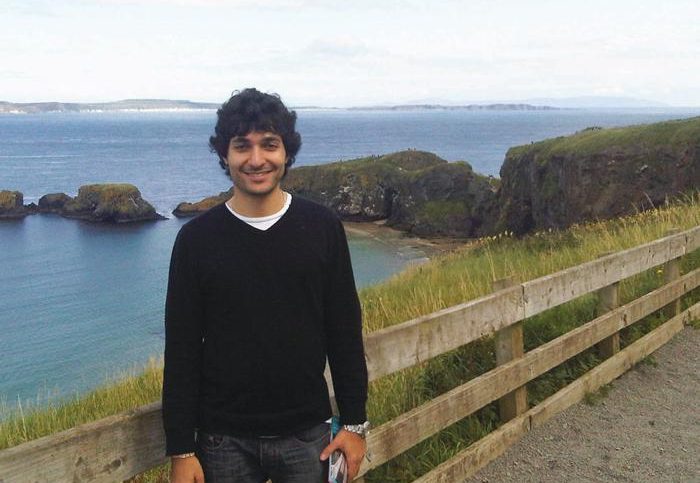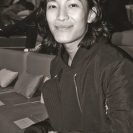Hadi Makarem was born and raised in Manama, Bahrain to parents who left their native Lebanon during the civil war. Having attended British schools from his Primary years through the PhD program he now pursues, he represents a very similar story to many of our Arabs abroad features, primarily for his life’s international scope, combined with a desire to dissect, understand, and ultimately improve, the homeland wherein his roots lie. While a childhood fascination with all things Jurassic in nature led to his first foray into the world of science at the University of Durham, it was not long before he found his way into Political Sciences. Now in the final year of his PHD program at the London School of Economics, we check in for a glimpse into his world.
What were the circumstances under which you left your home country?
The civil war in Lebanon forced my parents to look for a job elsewhere. They chose Bahrain at the time. I left Bahrain to attend university.
Have you always wanted to live abroad?
As a Lebanese person in Bahrain I’ve technically been abroad all my life. Going abroad is not something I planned. I think it was expected since we all went to an international school, and since all my friends (for the most part) went abroad for university. It seemed normal. Also, the fact that my parents and many of my relatives are ‘abroad’ makes the idea normal for me.
Where else have you lived?
After Bahrain, I lived in Durham, London, Beirut and Paris (currently), and soon back to London.
What is your favorite thing about where you live?
The thing with London is, it’s not just the capital of the UK, it’s a world capital. You see different cultures interacting together and meet people from all corners of the world. You also never get bored of it because there is always something new or different to do or discover.
What is the worst thing about where you live?
It’s expensive and the weather is not great most of the year. The food in the supermarkets is not great either, and because it’s a busy fast-paced city, it can get tiring.
How did you decide to go to London after your B.A. at Durham?
My supervisor at the time encouraged me to move to London if I wanted to continue my studies in postgraduate education; especially in a field such as the political sciences. London, he explained, was the best place to catapult myself into the field. So after completing my bachelor’s degree, I was accepted into the London School of Economics (LSE) to do a Master’s degree in ‘Global Politics’.
Any notable work to speak of at LSE?
It was during my Master’s degree that I worked as a research assistant for two notable figures: one was Professor Fawaz Gerges, an established academic at the LSE who produces research on International Relations in the Middle East, Political Islam, and US foreign policy to the Middle East; and the other was former Algerian foreign minister and UN peace envoy Lakhdar Brahimi. My work with Brahimi was particularly important, because it was at this point that I realized that if I wanted to do something involved in the Middle East, it would be related to postwar development and peace-building work. Of course, part of my interest was fueled by my personal background as a Lebanese citizen whose family migrated because of the civil war there.
How did this affect your views of home/work?
My learning experience was very schizophrenic in nature: on the one hand, I was told romantic stories of a beautiful country with a lush landscape, majestic history, hospitable people, great food, etc. (recurring themes that most people hear about the country). And on the other hand, I was bombarded with tragic tales of destruction, death and despair resulting from the civil war years. Our yearly trips to Lebanon did not help me understand the country any better. I saw the beauty, but I also saw the damage and division. It was on this basis that I decided to do a PhD thesis on reconstruction in Lebanon.
What is your favorite part of your job?
The best part of the PhD is doing the fieldwork, which involves meeting and interviewing very interesting characters who are/were involved in the topic you are writing about.
What are you working on currently?
Currently, I am doing a PhD in International Relations at the LSE. My PhD looks at neoliberal reconstruction in post-civil war Lebanon, and my case study in Solidere’s reconstruction of Downtown Beirut. I am currently in my final year of the PhD program.
What do you find most different about life inside and outside the Arab world?
Compared to the Gulf, there is more independence and freedom for the individual to live your life as you want. In London as well, you feel this independence because there are so many different people with different styles, different tastes, different outlooks, different features, etc., and all this means that there is no social pressure to conform to ‘what the society wants’.
What do you find most different about work inside and outside the Arab world?
Work outside the Gulf is faster paced and it seems like the people take their work more seriously. Obviously, I cannot speak for all people in the Gulf, but compared to London, it seems more people in the Gulf have a laid-back attitude when it comes to work.
Where is most of your family?
Our primary household is in Bahrain. But I have relatives everywhere (not just in Lebanon). They include, Kuwait, Qatar, Saudi and UAE, as well as Greece, Spain, France, UK, US and even Venezuela and Brazil.
How long will you stay abroad?
I am not sure, but I am hoping to explore a few more countries before I settle.
What do you miss most about home?
Of course I miss my family and friends, but other than that, I miss all the little things that relate me to my childhood and that I am most used to, like the car I drive, the TV channels I like to watch, the shisha cafes and restaurants that I go to a lot with friends.
If you could take one thing from home and place it where you are, what would it be?
The Sun!
Arabs abroad is our column that shines a light on the many interesting things that Arabs are doing around the world. If you have a friend or family member that you would like to nominate, let us know








